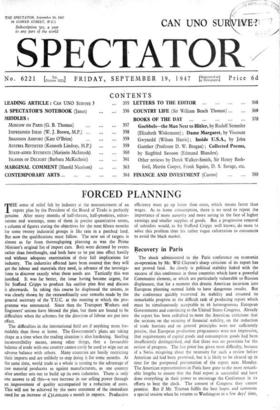FORCED PLANNING
THE sense of relief felt by industry at the announcement of an export plan by the President of the Board of Trade is perfectly genuine. After many months of half-threats, half-promises, exhor- tations and warnings, none of them in precise quantitative terms, a column of figures stating the objectives for the next fifteen months for some twenty industrial groups is like rain in a parched land. But now the qualifications must follow. The new set of targets is almost as far from thoroughgoing planning as was the Prime Minister's original list of import cuts. Both were dictated by events rather than forethought, and both have to be put into effect hastily and without adequate examination of their full implications for industry. The industries affected have been assured that they will get the labour and materials they need, in advance of the investiga- tions to discover exactly what those needs are. Tactically this was justified. It was far better, the issue having become urgent, for Sir Stafford Cripps to produce his outline plan first and discuss it afterwards. In taking this course he displeased the unions, as was clearly shown by the extraordinarily sour remarks made by the general secretary of the T.U.C. at the meeting at which the pro- gramme was announced. Since then the Transport Workers and Engineers' unions have blessed the plan, but there are bound to be difficulties when the schemes for the direction of labour are put into effect.
The difficulties in the international field are if anything more for- midable than those at home. The Government's plans are taking shape at a time when the trading situation is also hardening. Sterling inconvertibility means, among other things, that a favourable balance of trade with one country cannot easily be used to wipe out an adverse balance with others. Many countries are busily restricting their imports and are unlikely to stop doing it for some months. At the same time, world trade as a whole is turning to the advantage of raw material producers as against manufacturers, as one country after another sets out to build up its own industries. There is only one answer to all this—a vast increase in our selling power through an improvement of quality accompanied by a reduction of costs. This will not be achieved by the mere statement of the immediate need for an increase of £31,000,000 a month in exports. Productive
efficiency must go up faster than costs, which means faster than wages. As to home consumption, there is no need to repeat the importance of more austerity and more saving in the face of higher earnings and smaller supplies of goods. But a progressive removal of subsidies would, as Sir Stafford Cripps well knows, do more to solve this problem than his rather vague exhortation to consumers to avoid the black market.


































